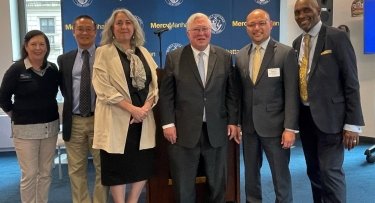
From left to right: Mercy College Chief Advancement Officer Bernadette Wade; David Wang, M.S. ’11, Ed.D., Mercy College associate professor and chair of the Department of Mathematics and Computer Sciences; Eva Fernandez, Mercy College Provost and Vice President of Academic Affairs; Mercy College President Tim Hall; Wayne Ho, President and CEO of the Chinese American Planning Council, Inc.; Scorpio Rogers, Ph.D., vice president of Mercy’s Bronx and Manhattan Campuses.
On May 9, 2023, Mercy College gathered community partner organizations, students, faculty and staff at its Manhattan Campus – located in Herald Square – in celebration of Asian American and Pacific Islander (AAPI) Heritage Month. Mercy President Tim Hall hosted the reception, which included a keynote speech by Wayne Ho, President and CEO of the Chinese American Planning Council, Inc., and remarks from David Wang, M.S. ’11, Ed.D., Mercy College associate professor and chair of the Department of Mathematics and Computer Sciences, and Scorpio Rogers, Ph.D., vice president of Mercy’s Bronx and Manhattan Campuses.
“It’s my pleasure to welcome you this evening to the Mercy College Asian American and Pacific Islander Heritage Month Community Reception. What’s special about this month is that it’s an opportunity to celebrate many cultures, backgrounds and experiences,” said Wang, in opening the program.
In his remarks, Hall said, “[Mercy College] is the largest minority serving private institution in the state of New York. That didn't happen accidentally. It happened because we believed in welcoming whoever came toward us. And the people who are coming toward us are flourishing, learning, and graduating… we are privileged to serve these students.”
Rogers noted how Mercy as an institution thrives through the establishment of partnerships with community organizations, like the Chinese American Planning Council, Inc., and others in attendance. “I hope we’ll get a chance to discuss how Mercy can serve as a pipeline to students whose prospects you are interested in advancing,” he said.
He also highlighted the programs that are expanding Mercy’s reach, both domestically and internationally. “Since we’re here, in the heart of Manhattan, we are home to Mercy’s international admissions office and Mercy College International – a pathway program that gives student from all over the world the opportunity to obtain a high quality undergraduate or graduate degree in New York City.”
As president and CEO of the Chinese American Planning Council, Ho leads the nation’s largest Asian American social services organization. Among many programs, the Council provides high-quality learning opportunities, from Pre-K and after-school enrichment to adult English language classes.
Ho provided a historical overview of how AAPI communities, as immigrants, were the main contributors to critical infrastructure developments in the U.S. He also gave insight into the challenges AAPI communities face, particularly in New York. “New York City has 8.5 million residents, the fastest growing group, racial group, are Asian-Americans. We make up 18% of New York City and 10% of New York State. So, about 1.6 million residents in New York City are of Asian background. That means there are more Asians here than there are people in the entire city of San Francisco.”
Ho spoke to the importance of allyship in addressing the challenges that AAPI communities face. “We’ve worked with allies across communities of color, Jewish communities, white allies, to say we all stand together to make sure that every neighborhood where someone lives works, plays, studies or worships has to be safe…from kids to seniors, whether you're black, brown, Asian or white, it has to be safe for everyone,” Ho continued. “And that's why having an event like AAPI Heritage Month becomes very important, because I started my career in K-12 education, and I'm still a fundamental believer that education can be the great equalizer in this country.”
“At Mercy, I have the privilege of educating a diverse, motivated student population who are in the classroom because they want to be in the classroom. They are immigrants, they are parents, they are in their twenties, thirties and forties…the pressure to succeed can be all consuming. Some AAPI students must maintain their roles as family caretakers and breadwinners,” said Wang, in concluding the program.
“I tell my students, if you work hard, you can succeed. And they do. Time and again, I'm amazed, but not at all surprised, by my Mercy students’ resilience and determination.”
To view video highlights from the AAPI community reception, please click here.
